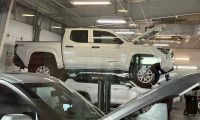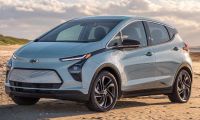Lutz's piece in Forbes hammered on statements by Toyota's Takeshi Uchiyamada – the father of the Prius – to the effect that battery electrics are never going to get anywhere.
The problem here is that Lutz takes the knee-jerk road in his reaction, turning his disagreement 180 degrees to polarize on the opposite ideal – a future with only electric cars full of batteries and happy sunshine goodness. Remember, Lutz is the "father of the Volt" and one of the suits behind companies like VIA Motors, which hopes to sell electrified General Motors trucks – although their business model seems more in tune with hoping GM will just buy them out down the road.
The fact of the matter is, Lutz is dead wrong and Uchiyamada isn't exactly right either. Automakers aren't "disappointed" with EVs, they're just realistic. The cars aren't big sellers except in very limited markets to very specific buyers. Blame it on "range anxiety" or "fueling inconvenience" or whatever else you'd like, the reality is that electric cars aren't selling like hotcakes and they aren't displacing petroleum-burning vehicles at all – their growth, as percentage of market, is less than the overall industry's growth and sales.
Lutz Knows Better
The crux of the problem is that Lutz should know better – probably does know better – but would be shooting himself in the foot were he to admit reality. Carmakers are not "disappointed in electric cars" and thus "making bad bet[s] on fuel cells." Lutz, as one of the industry's ultimate insiders, should know that every major automaker he's worked with has been developing fuel cell technology for years; decades, in fact.
For a very long time, General Motors was at the forefront of automotive fuel cell research (and continues to be a player). BMW, where Lutz also worked in management, has been spearheading the charge in Europe. Toyota, Ford, Hyundai, Chrysler, Honda.. all have been working with hydrogen fuel cells for years now. About as long as they've been working on modern electric vehicles, in fact. Some even longer than that.
So Lutz's claim that automakers are dumping electrics in favor of fuel cells is disingenuous and borders on outright misrepresentation. Lutz at least openly admits that fuel cells are just another kind of battery for an electric car. The only real difference between a fuel cell and a battery is the chemistry used to store and release the power.
They're Just Batteries, Bob
A fuel cell takes hydrogen (H2), sends it through a catalyst where it meets up with oxygen (coming in from outside) and has a chemical reaction that makes water (H2O), throwing off an electron to send through a circuit in the process. That electron powers the electric motors that move the car.
A battery receives electricity from another source (e.g. the wall outlet) and stores it by shuffling chemicals around and then shuffling them back when the power is needed to turn the electric motor and move the car. The specific chemistry changes according to the type of battery being used. Lead-acid (common in our gasoline vehicles) ionizes a chemical mixture; lithium-ion batteries do much the same using lithium as the item being shuffled to and from carbon.
Lutz continues on by pointing out all of the usual flaws in hydrogen that most anti-H2 pundits trot out when they're busy bashing on fuel cells. Namely that hydrogen requires energy to produce, must be shipped around, and so forth. These are valid concerns, but are often blown well out of proportion and ignore the fact that battery electric vehicles have the same problems. The "infrastructure" for EVs is nearly non-existent outside of small geographic areas on the left coast, electricity sent through power lines on the grid sees huge losses due to conductivity and so forth (thus it has a "shipping cost" just as hydrogen would), electric vehicles take forever to charge from the "outlets a-plenty in every home and garage," etc.
Someone should tell the "father of the Volt" that when I had one as a test vehicle, it took 11 hours to recharge for a whopping 30-some miles of driving. To get a "fast charger" requires the consumer to shell out thousands of dollars over and above the cost of the EV itself.
Hydrogen fuel cells have distinct advantages over battery electrics. The biggest being longevity. Fuel cells can be expected to last far longer than even the best lithium-ion battery can – and without losing much viability over time. New research has also eliminated one of the fuel cell's biggest issues, cost of manufacture, by replacing precious metals in the catalyst with common materials – a fact Lutz ignores in his anti-H2 diatribe.
Beyond Lutz attempts to insinuate that fuel cells are some kind of "evil foreign Japanese technology," his piece is largely misleading and conveniently ignores the most important part of the entire energy debate as it applies to vehicles.
Monofueling Sux
Our number one problem, which has been around for more than half a century, is that we fuel our cars entirely with petroleum. Top to bottom, left to right, driveway to driveway, we use petroleum fuels to power our vehicles. Our chief difficulty is that we've put all of our eggs into the petro basket to the exclusion of all other options. Every fuel that isn't petroleum-based is a niche fuel.
Oil has afforded us a lot of positive things: prosperity that couldn't have been dreamed of a century ago, improved use of other resources thanks to the cheap energy oil provides, and an opening of the global economy never before seen. Of course, oil has its down sides. Plenty of them. The longer we've used it, the more obvious those downers have become. So now, we're looking for alternatives.
The problem here is that men like Lutz seem to think that we just need to swap one monofuel for another. Discard the gas tank and replace it with batteries. Done.
This ignores a highly valuable lesson that oil has taught us: when we choose to monofuel, we choose to cycle through prosperity to ruin. Tossing gas tanks for batteries is just another wash-rinse cycle of repetition.
Think of it this way: if you have only one means of income in your household, you are entirely dependent on that income to sustain you. If anything happens to it – the person making it is hurt or becomes ill, the business paying it closes down, the job becomes outsourced, etc. - then you are left with nothing. You invested your entire financial security into that one job. If, instead, you had multiple streams of income (to steal the marketing phrase), however, losing one would just mean cutting back until you find a replacement.
So it is with fuels. Rather than putting all of our energy eggs into just one basket and hoping that something doesn't happen to smash them, wouldn't we be better off spreading them around to several different baskets, each of which serves a specific purpose and market and without any of which we could still survive and thrive?
Think about that. Batteries in cars work well in specific parts of the market. Namely urban drivers with short commutes and a relatively high vehicle replacement rate. Fuel cells work well in markets which require longer ranges and longevity. Petroleum fuels work well in specific markets that require very long ranges and a widely distributed infrastructure to support them. Natural gas works well in markets that have an abundance of the fuel and is cheaper to implement than the other options (sans gasoline/diesel). Range-extended electrics could replace some of these applications and could implement some of them to further increase their efficiency as well (a NG or diesel generator is far more energy efficient than is one using gasoline, for example).
The diversity of fuel options means that not only can we regionalize our fuel uses to improve efficiencies and lower costs, but we can also give consumers a wider choice of options. Further, automakers could make the same car with a vast array of powertrain options to sell in this diversified market – Ford has been leading the way on that idea already.
So, I'll close with Lutz's closing statement.
I could be wrong. But I don't think so.
Set Torque News as Preferred Source on Google











Comments
Batteries will get better
Permalink
Batteries will get better (cheaper, more dense). Who knows when the amazing nanowire Lithium cells will come to market and their longevity.
Good Lithium batteries, like in the Honda Fit EV (from wiki; The Fit EV employs Toshiba's SCiB batteries that can be recharged to 80% capacity in 15 minutes and can be recharged up to 4,000 times, more than 2.5 times that of other Li-ion batteries. The battery cells use lithium titanate oxide in the anode, providing rapid charge times and extending battery life) might last 15 years or more before the range starts being crappy (unless you live in Arizona and if the battery doesn't have a liquid thermal management system!). Really the most economical thing to do is to drive an old 4 cylinder gas car (lats 90s or newer so it is somewhat safe). Gas just isn't that expensive in the US and cars usually don't need major repairs unless you do (or don't do) something to cause it.
One of the main concerns is that the oil companies will control the infrastructure of Hydrogen.
I think it would ease concerns about Hydrogen if consumers could fill up their cars from an outlet in their garage, creating hydrogen from electrolysis in their garage. But that would take up a lot more space than a L2 or L3 EV charger. Need room for the dry cell, the hydrogen tank, the electrolyte resovoir.
I fail to see the logic in
Permalink
In reply to Batteries will get better by danwat1234 (not verified)
I fail to see the logic in this fear of oil companies "controlling" hydrogen. Most people seem oblivious to the fact that these energy companies also "control" most of the energy grid, including alternative power sources.
Nevermind that your dreamy battery recharge speed for the Fit doesn't include this little tidbit of information: it's only possible with expensive ($100k+) DC fast chargers that will never be installed in a home because they have higher power requirements than most electrical grids can deliver to residential sectors.
But if some kind of "next
Permalink
But if some kind of "next generation" lithium ion batteries don't emerge, then fuel cells could become a part of the car market. It's good to have a variety of ways to fuel America so both electric and Hydrogen can do that, since Hydrogen is gathered by using Electricity and Electricity can be generated from so many ways.
Fuel cells make no sense
Permalink
Fuel cells make no sense given any viable alternative. They are a space program byproduct looking for a home. Don’t think so? Look at the leaders of the FC industry and you will find they are concentrated in CT and CA and began as defense and space program suppliers. Anyone with a basic understanding of science or engineering knows they serve no purpose in a consumer product. The original point of using a FC in a car was to "reduce greenhouse gases." Fuel cells don't help with this goal. H2 can only come from chemical stripping of H out of hydrocarbons, and CO2 is a byproduct, or via electrolysis, which consumes too much energy to make it viable. Looking at the redox reaction of the cell with H2 makes no sense. Back-up and look at the redox reaction of the precursor hydrocarbon and there is always CO2 on the right. Also, the H2, regardless of where it comes from, cannot be contained effectively, which reduces the total energy used by a large percentage. We cannot figure out a way to get it, move it, and get it into vehicles without losing a lot of it. The plans to move H2 around involve super-cooling. Where are you going to get the free energy for cooling? That adds to the energy imbalance and the CO2 footprint.
Can we make a fuel cell car – yes, Honda has already. But why? To satisfy well intentioned, but non-technical politicians and their herd? At some point the energy balance has to have a net positive or the whole thing is a lark.
Lutz is like an aging boxer who can't stand not to be included in the conversation. He was a car-guy responsible for a lot of good in his career, but it is over now and he wants to still be involved. His choice on how to leave his legacy.
No such thing as net
Permalink
In reply to Fuel cells make no sense by John Goreham
No such thing as net positive. Simple physics.